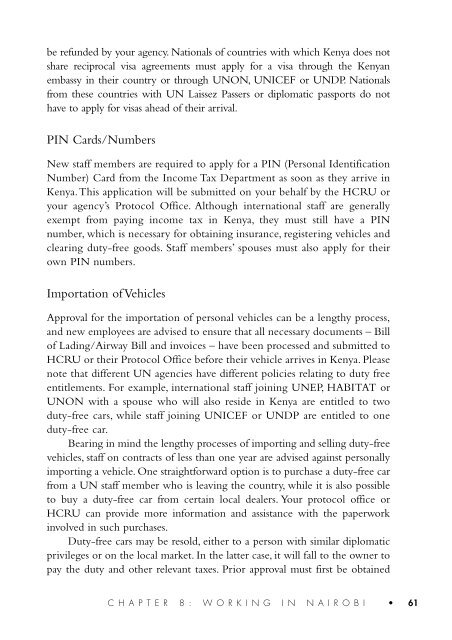KARIBU KENYA - UNON - the United Nations Office at Nairobi
KARIBU KENYA - UNON - the United Nations Office at Nairobi
KARIBU KENYA - UNON - the United Nations Office at Nairobi
You also want an ePaper? Increase the reach of your titles
YUMPU automatically turns print PDFs into web optimized ePapers that Google loves.
e refunded by your agency. N<strong>at</strong>ionals of countries with which Kenya does not<br />
share reciprocal visa agreements must apply for a visa through <strong>the</strong> Kenyan<br />
embassy in <strong>the</strong>ir country or through <strong>UNON</strong>, UNICEF or UNDP. N<strong>at</strong>ionals<br />
from <strong>the</strong>se countries with UN Laissez Passers or diplom<strong>at</strong>ic passports do not<br />
have to apply for visas ahead of <strong>the</strong>ir arrival.<br />
PIN Cards/Numbers<br />
New staff members are required to apply for a PIN (Personal Identific<strong>at</strong>ion<br />
Number) Card from <strong>the</strong> Income Tax Department as soon as <strong>the</strong>y arrive in<br />
Kenya.This applic<strong>at</strong>ion will be submitted on your behalf by <strong>the</strong> HCRU or<br />
your agency’s Protocol <strong>Office</strong>. Although intern<strong>at</strong>ional staff are generally<br />
exempt from paying income tax in Kenya, <strong>the</strong>y must still have a PIN<br />
number, which is necessary for obtaining insurance, registering vehicles and<br />
clearing duty-free goods. Staff members’ spouses must also apply for <strong>the</strong>ir<br />
own PIN numbers.<br />
Import<strong>at</strong>ion of Vehicles<br />
Approval for <strong>the</strong> import<strong>at</strong>ion of personal vehicles can be a lengthy process,<br />
and new employees are advised to ensure th<strong>at</strong> all necessary documents – Bill<br />
of Lading/Airway Bill and invoices – have been processed and submitted to<br />
HCRU or <strong>the</strong>ir Protocol <strong>Office</strong> before <strong>the</strong>ir vehicle arrives in Kenya. Please<br />
note th<strong>at</strong> different UN agencies have different policies rel<strong>at</strong>ing to duty free<br />
entitlements. For example, intern<strong>at</strong>ional staff joining UNEP, HABITAT or<br />
<strong>UNON</strong> with a spouse who will also reside in Kenya are entitled to two<br />
duty-free cars, while staff joining UNICEF or UNDP are entitled to one<br />
duty-free car.<br />
Bearing in mind <strong>the</strong> lengthy processes of importing and selling duty-free<br />
vehicles, staff on contracts of less than one year are advised against personally<br />
importing a vehicle. One straightforward option is to purchase a duty-free car<br />
from a UN staff member who is leaving <strong>the</strong> country, while it is also possible<br />
to buy a duty-free car from certain local dealers. Your protocol office or<br />
HCRU can provide more inform<strong>at</strong>ion and assistance with <strong>the</strong> paperwork<br />
involved in such purchases.<br />
Duty-free cars may be resold, ei<strong>the</strong>r to a person with similar diplom<strong>at</strong>ic<br />
privileges or on <strong>the</strong> local market. In <strong>the</strong> l<strong>at</strong>ter case, it will fall to <strong>the</strong> owner to<br />
pay <strong>the</strong> duty and o<strong>the</strong>r relevant taxes. Prior approval must first be obtained<br />
CHAPTER 8: WORKING IN NAIROBI • 61


